It's the time of the year when gardens are on the verge of booming. Colorful berries here are there. Don't you love snacking on berries? Rush to the grocery stores to buy from the fresh berry lot, or if you have grown them in your backyard, put on those gloves and start picking them up.
If you are interested to know more about methods ‘how to wash blueberries’, or how to wash blueberries to last longer, the guide will drive you to the right path. In the article you will know about the methods and processes to clean blueberries.
Table of Contents
- Is Preserving and Storing Blueberries is Crucial?
- Why is it necessary to wash blueberries?
- Why should blueberries be treated gently?
- Why shouldn’t berries be treated with tap water?
- Methods to wash blueberries
- Things you need
- Approaches to washing blueberries
- Are there any helpful tips to freeze berries?
- Conclusion
- Frequently Asked Questions
Is Preserving and Storing Blueberries is Crucial?
Don't be guilty if your appetite has made you buy a hell of a lot of these fresh-looking berries. All of us have guilty pleasures. But don't scratch your head worrying about their storage. Does your berry soon change the color even when cooled? Want to know the secret hacks for storing berries for long? Discover secrets, hacks, and tips in this article to sustain their freshness and craving for more flavor to boost your culinary appetite.
Why is it necessary to wash blueberries?
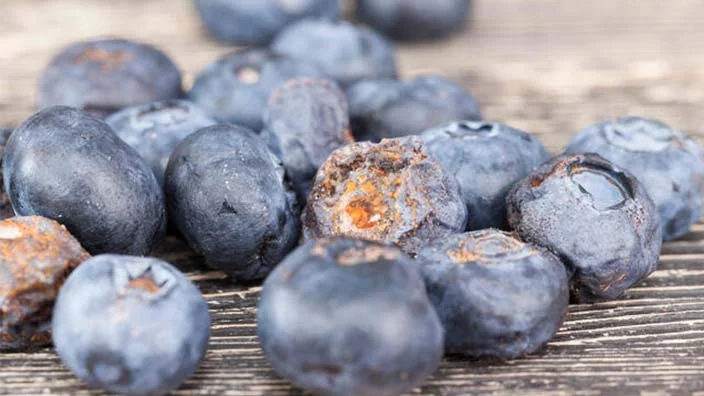
Fresh berries that are naturally grown need to be washed carefully. However, the ones that come with a manufacturer's packaging don’t need to be rinsed. It is always advisable to wash every fruit right before you eat. All fruits, including blueberries, may have traces of dirt, harmful bacteria, pesticides, or even mold that, once ingested, may become a prevalent cause of your sickness.
For a delightful yet healthy snacking experience, it is prudent to consume blueberries after washing them carefully with water. Yet again, washing berries is another task that needs dire attention.
Why should blueberries be treated gently?
Blueberries are immensely delicate and need to be handled with care. If you don’t treat them gently, the probability is that you might lose the texture, smoothness, and shape of the berries that you have bought or grown with so much zeal and fervor.
Why shouldn’t berries be treated with tap water?
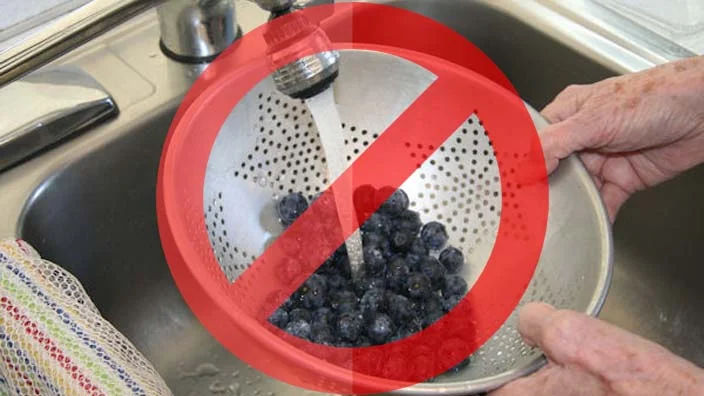
Berries should only be washed if they're being consumed. The more they are treated with excess water, the more likely they can be damaged and squeezed due to premature spoilage. In grocery stores, berries usually are stacked over one another in a container.
There are better approaches to washing than placing this container under tap water. The pressure of tap water will most likely disrupt their shape and turn them into mushy structures that wouldn’t appeal to anyone.
The query of how to wash berries still needs to be answered. Well, to put a full stop to your never-ending worries about how to wash blueberries, carefully read the article disclosing the following hacks for your understanding.
Methods to wash blueberries
Washing blueberries, unlike any other fruit, is not as simple as 123. You should have access to a few of these things to ensure the task of berry washing is successful regardless to the process you move for. Washing blueberries seems a simple process but it requires certain technique to avoid damage to the blueberries like the processes discussed in the articleHow to Wash Hey Dude.
However, it is pertinent to mention here that we have few options to wash blueberries to remove pesticides including but not limited to washing blueberries with baking soda, with vinegar, with salt or even without use of vinegar. Let’s explore more on this.
Things you need
Following infographic shows the essentials, which are needed to wash the blueberries with the help of available solutions.
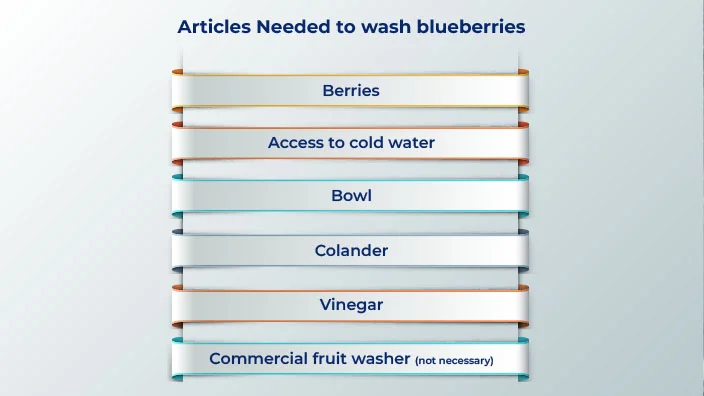
Approaches to washing blueberries
To ensure antioxidant-rich fruits like blueberries are washed carefully, browse through the following steps and methods to conquer the mission.
Washing blueberries with water
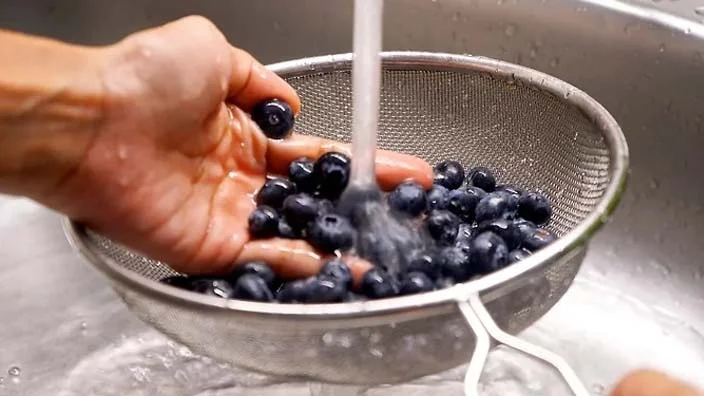
- Fill a large, spacious bowl with cool water and place the delicate berries in the bowl via a colander.
- In this way, very little water comes in contact with berries, preventing berry damage and excessive berry sogginess.
- Discolored berries should be removed the moment you spot them.
- Also, berries with mold should be eradicated, as the mold may spread from one berry to another, spoiling the entire lot.
- Check for debris or small traces of dirt lying on the berry surface.
- Alternatively, you can place all the berries in a colander and keep the colander under a gentle stream of cold water.
- Shake the colander, ensure evenly washing, and avoid touching too much of the berries.
Washing blueberries with Baking Soda
In order to wash blueberries with the help of baking soda; you are supposed to create a solution with the mixture of baking soda and the water with the ratio of 1:3. Keep the blueberries in the solution for approx. 10 minutes then use cold water to rinse the berries. You will see that the baking soda helped in removing the dirt, pesticides and other hazardous elements from the berries leaving the berries clean and refresh for the practical purposes.
Washing Blueberries with Vinegar
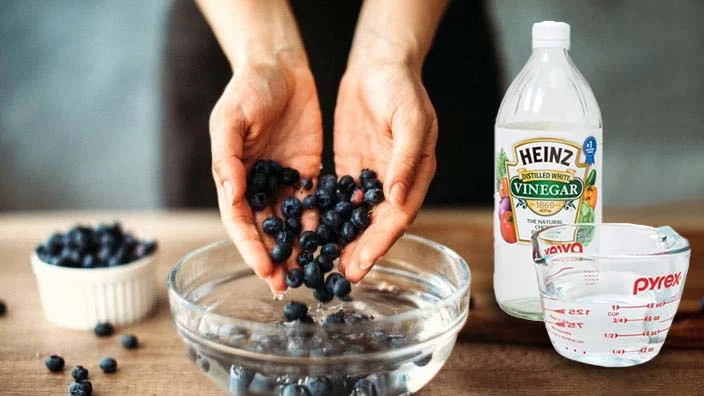
If you also gets disgusted even watching mushy or moldy berries, you would be very cautious when dealing with blueberries. And if you need more than water, try dealing your blueberries with vinegar. Answer to the question ‘do you clean blueberries with vinegar? Has been described in the following manner. The water-vinegar solution is the perfect pick for you if you're looking for ways to help your berries last longer.
- To begin with, look out for moldy or discolored ones and remove them quickly.
- Wrinkled and crushed ones should be removed, too.
- Don't panic; if you missed one or two, you may have another chance to confiscate those filthy ones since you certainly want to garbage your lot.
- Fill a bowl with water.
- Maintain a ratio of 3:1 of your solution, i.e., mix three parts water with one part vinegar. For instance, 3 cups (710 mL) of water should have 1 cup (240 mL) of vinegar.
- A commercial fruit washer can also be bought from the neighborhood shop if you have doubts about the smell of vinegar.
- Fill up the bowl with as many berries as the bowl can accommodate. Be mindful not to overflow.
- Swish the water-filled bowl with your hands, but please be sure to be gentle and have some patience, too; don't dash and swap.
- Let them soak in the vinegar-water mixture for 10 minutes. Set your stopwatch in case you start binge-watching.
- Pick those berries with the help of a colander or empty the contents of the bowl in the colander to let the excess water drain out.
- Under the gentle stream of water, rinse your berries to let go of the vinegar reek. Keep rinsing until you can’t feel the nosy smell.
Washing blueberries with salt solution
Washing your blueberries with a salt solution is yet another successful hack.
- Gently place them in a salt solution via a colander.
- After letting them sink for a while, rinse it off gently.
Following the wash, place the berries on a paper towel-lined. Once the berries dry up a bit, store them in an air-tight container inside the refrigerator.
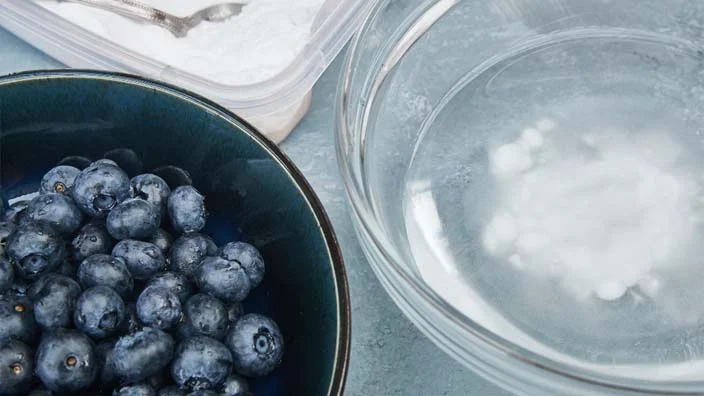
Are there any helpful tips to freeze berries?
Yes, berries can be frozen for long. In fact, frozen berries work best when you’re more of a smoothie or juices kind of person. But the only thing you should be mindful of is to choose the correct method in doing so. Wrong directions will not only rot your berries but will disgust your freezer with the most awful smell.
Indeed, prevention is better than cure. Just as you have followed the steps for how to wash berries, likewise carefully follow these steps to storing berries, and you'll thank us for enjoying the delish smoothies.
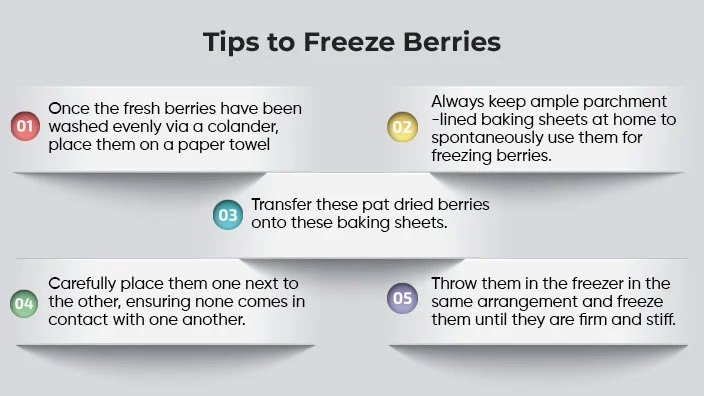
Conclusion
It is always advised to thoroughly wash your berries before gobbling them up; otherwise, you may have to spend hours in the washroom because of food poisoning, and the possible cause may be eating unwashed blueberries last night. In the article several methods, process and articles needed to wash carefully the blueberries have described for the quick exposure of the readers.
The question how to wash blueberries can be answered with the use of baking soda, salt solution, vinegar etc. so as to deliver variety of the methods to the please and convenience of the readers. To mitigate such consequences, always remember the tips we have highlighted on how to wash berries and devour these delicious berries without having to worry about cutting the cheese or food poisoning.
Frequently Asked Questions
How to choose berries?
Berries should be chosen wisely since we've often heard about berry contamination and its serious consequences. It is, therefore, advisable to choose organic berries from the grocery stores, or if you have a huge backyard, then prefer growing them on your own.
How do you soak blueberries to get clean ones?
To obtain clean berries, soak the blueberries in a vinegar water solution. Ensure to maintain the ratio of 3 parts water to 1 part vinegar. Rinse them off after soaking for 10 minutes.
Washing your blueberries is necessary?
Yes, you must wash every fruit before eating as the fruit may have surface contaminants that will hurt your belly.
Is the white fog on blueberries harmful?
A big no: the white fog on the blueberries isn't harmful. It is indeed a sign of freshness. The fresher the blueberries are, the larger the white bloom will be. This white bloom plays a key role in retaining moisture, ensuring you eat the purple pulpy fruit with its yearning flavor.
How long to soak blueberries in vinegar
Immerse your blueberries in the water with appropriate ratio and gently agitate them. Keep the berries in the water to soak for 5-10 minutes. Then, drain the berries, and rinse them with a light spray of running water.
How do you wash blueberries to get rid of pesticides?
In order to dissolve pesticides from the blueberries; hold the fruit or vegetable as the case may be, in the flowing water in a strainer. However, the FDA didn’t recommend washing fruits and vegetables with soap or any detergent.
Is it better to wash berries in vinegar or baking soda?
Blueberries washed in the water or in the baking soda have been found softer and cleaner than those which were made subjected to wash with the use of vinegar, which keep them firm.


















